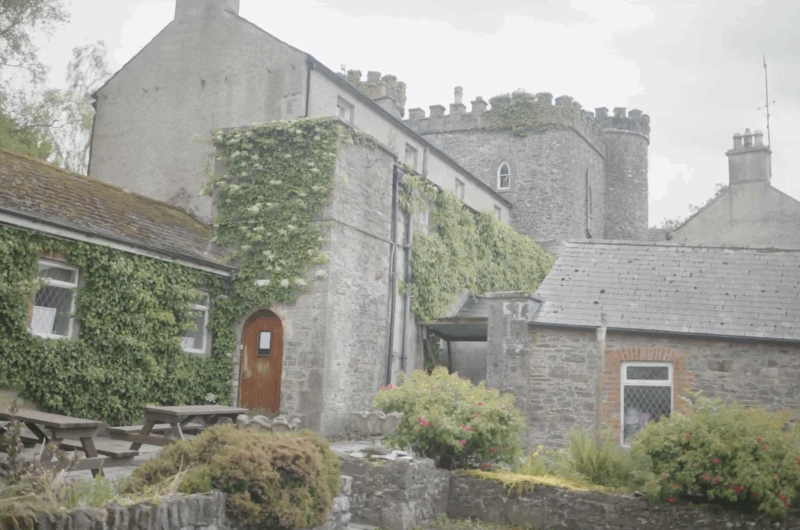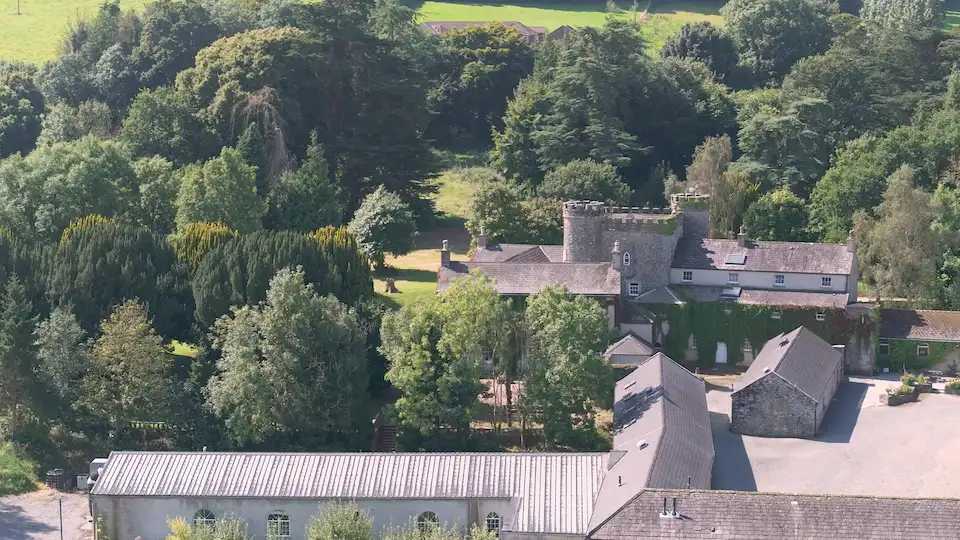
Ketamine Withdrawal: Find Relief and Recovery
Ketamine detox is an important step towards recovery and dependence on this powerful dissociative anaesthetic. If you’re considering treatment, know that recovery is possible with the right professional support. At Smarmore Castle, we provide medically supervised detox programmes designed to safely manage your withdrawal in a safe, clinical setting whilst supporting your journey towards lasting recovery.
If you or someone you care about is struggling with ketamine misuse or substance abuse, understanding the withdrawal process and recognising ketamine detox symptoms can help you make informed decisions about treatment options.
The Need for Ketamine Detox and Withdrawal Services in Ireland
During a Drug Use in Higher Education (DUHEI) study in 2021, ketamine was the fourth most commonly used drug, with 16% of students reporting taking ketamine in their lifetime, and 46.7% of those current ketamine users.1
In a European Web Survey on Drugs from 2021, 24% of respondents took ketamine, and 36% of those were male, aged 18-24.2
Detoxification from ketamine involves more than simply removing the substance from your system; it requires comprehensive management of the physical, psychological, and emotional effects that can occur once ketamine is no longer taken.
Learn More About Ketamine Addiction
Find out more about ketamine addiction signs and symptoms here.
Residential Ketamine Detox Treatment in Ireland
Ketamine addiction treatment begins with a medical detox, which often represents the crucial first step towards recovery. Ketamine belongs to the broader class of dissociative anaesthetics, which are known for inducing trance-like states and hallucinations, and are used both medically and recreationally. It is classified as a ‘dissociative anaesthetic’ and is used in both human and veterinary medical settings in anaesthesia and for pain management.3
Recovery is achievable through evidence-based therapies and professional treatment. Comprehensive treatment for ketamine addiction includes both medical detox and ongoing therapeutic support. With appropriate clinical support, individuals may reduce their risk of relapse, develop healthier coping strategies, and begin their recovery journey towards lasting recovery.

The team at Smarmore Castle provides a medically supervised detox programme specifically designed to manage your ketamine withdrawal symptoms with clinical expertise and compassionate care. Our ketamine addiction treatment programme addresses both the physical withdrawal symptoms and psychological withdrawal symptoms that users may experience. Whilst ketamine is used in medical settings, it is administered under professional supervision to ensure safety and effectiveness, which is distinct from the risks associated with recreational misuse, where there is no medical supervision.https://www.smarmorecastle.ie/addiction-treatment/detox/
Our residential addiction treatment centre combines evidence-based medical protocols with therapeutic support in a peaceful, private, and confidential setting designed to promote your healing and recovery.
Understanding Ketamine Detoxification and the Detox Process
Medical detox is the medically supervised process of safely stopping the use of ketamine whilst clearing the substance from the body. Throughout this detox process, patients receive continuous monitoring from qualified medical professionals to help manage withdrawal symptoms and minimise the risk of complications during the recovery process.
Ketamine users undergoing ketamine withdrawal require specialised care, as the dissociative drug affects multiple body systems. Attempting to quit “cold turkey” without medical supervision can lead to severe symptoms and increased risk of relapse. As ketamine increases in use or dosage, the risk of psychological dependence and withdrawal symptoms also rises, due to changes in brain chemistry.
Whilst detoxification addresses the physical aspects of dependence, it forms just one component of comprehensive addiction treatment. A complete treatment programme typically includes psychological therapy, group therapy sessions, and long-term aftercare planning. This integrated approach may provide the strongest foundation for recovery.
Related treatment programmes at Smarmore Castle include cocaine detox, alcohol detox, and prescription drug detox services.

Download our Brochure
What Is Ketamine Withdrawal and Ketamine Dependence?
Ketamine withdrawal encompasses the physical symptoms and psychological symptoms that can occur when someone with ketamine dependence or psychological dependence significantly reduces ketamine use or stops their last dose. Symptoms can vary in intensity based on factors like the frequency of use, higher doses, duration of substance use, and your individual health circumstances.
Although most ketamine withdrawal symptoms are rarely life-threatening, they can cause significant discomfort and distress. Some people may wonder, “Can ketamine kill during withdrawal?”. While ketamine withdrawal is rarely fatal and does not typically result in death, medical supervision is important to help manage any risks and ensure your safety during the process. Common ketamine withdrawal symptoms can persist for several weeks, particularly if you have developed regular patterns of substance misuse. Professional treatment is designed to ensure you don’t face these challenges without the appropriate support and clinical oversight in place.
Begin Your Recovery Journey from Ketamine Addiction
If you or someone you care about is experiencing addiction to ketamine or the negative consequences of ketamine misuse, seeking help as early as possible can make a meaningful difference to your treatment and recovery. Inpatient treatment within a safe, supportive clinical environment, such as Smarmore Castle, may significantly improve your recovery experience and provide access to comprehensive treatment options.
Find Us
Smarmore Castle Clinic, Near Ardee, County Louth, Ireland A92 YY22
-
How to Find Private Ketamine Detox Treatment Near You
Ketamine detox can be challenging, especially if you’ve been using the drug regularly or in high doses. Although not everyone experiences physical withdrawal, many people find the psychological symptoms difficult to manage without professional support. That’s why choosing a private treatment centre that offers a medically managed, personalised detox plan is essential.
Below are steps to help you find the right care for ketamine detox near you.
Search for Private Detox Clinics with Medical Support
Start by looking for residential rehab clinics that offer medically supervised ketamine detox. Use searches like “private ketamine detox in Ireland” or “ketamine rehab near Dublin” to locate clinics with experience in treating ketamine dependence. Ensure the clinic is regulated and provides 24/7 medical supervision, particularly if withdrawal symptoms may require monitoring.
Speak to an Addiction Specialist First
Before choosing a clinic, consider speaking with an addiction professional. They can help assess whether ketamine detox is necessary and guide you toward safe and appropriate care. An independent specialist can also explain what to expect during detox and how to manage your symptoms with medical and psychological support.
Understand the Role of Medication in Ketamine Detox
Unlike alcohol or opioids, ketamine withdrawal is not typically life-threatening and may not always require medication. However, some people benefit from short-term support for anxiety, sleep problems, or mood instability. A consultant psychiatrist should determine whether medication is appropriate based on your individual needs.
Check Your Private Health Insurance Coverage
If you have private health insurance, review your policy for inpatient addiction treatment coverage. Some plans include benefits for medically managed detox and residential rehabilitation, which can help with costs. Contact your insurer to confirm eligibility and any necessary pre-authorisation.
Ask About Inpatient Amenities and Environment
A safe, structured, and comfortable setting can make a significant difference during detox. When evaluating clinics, ask about the living arrangements, medical facilities, and access to therapeutic staff. A peaceful environment, supportive community, and trained professionals can make ketamine detox more manageable and less distressing.
Inquire About Ongoing Care After Detox
Detox is only the first step in overcoming ketamine dependence during recovery. To maintain your progress, you’ll need access to ongoing psychological therapy as well as relapse prevention support. Choose a centre that integrates detox into a full treatment programme, offering individual and group therapy, psychoeducation, trauma-informed care, and continuing support for life after rehab.
Support is available. You don’t need to manage ketamine withdrawal symptoms alone. Contact our confidential admissions team on 041 986 5080 to discuss your treatment options and begin your recovery journey. Our admissions process is designed to be straightforward and supportive, with immediate assessment available for urgent cases.
What Are the Benefits of Residential Ketamine Detox Treatment
Inpatient detox treatment provides a secure, structured environment specifically designed to support recovery. At Smarmore Castle, patients receive round-the-clock clinical supervision, helping to ensure safety and comfort during the most challenging phases of withdrawal.
Key benefits include:
- Medical monitoring and assessment
- Immediate access to therapeutic support services
- Peer support from like-minded people in recovery
- Peaceful, private, and confidential setting conducive to healing
- Personalised care plans adjusted to meet individual needs
- 24/7 nursing support and medical intervention when required
Ketamine Withdrawal Symptoms and Physical Effects
Ketamine withdrawal can affect physical, mental, and emotional well-being through various ketamine detox symptoms. Whilst individual symptoms vary, some commonly reported ketamine withdrawal symptoms include:
Psychological Withdrawal Symptoms
- Anxiety and feelings of panic
- Depression or persistently low mood
- Mood swings, agitation, and rage
- Intense cravings for ketamine
- Confusion or disorientation leading to cognitive impairment
- Psychological issues, including psychosis and emotional instability
- In severe symptom cases, suicidal ideation may occur
Physical Withdrawal Symptoms and Physical Effects
- Sleep disturbances or insomnia affecting the recovery process
- Nausea
- Muscle tremors or aches throughout the body
- Fatigue or exhaustion lasting a few days to several weeks
- Excessive sweating or rapid breathing patterns
- Elevated blood pressure requiring monitoring
- Visual disturbances, including blurred or double vision
- Urinary tract complications are common in chronic ketamine users. Intravenous fluids may be administered during ketamine detox to manage dehydration and help stabilise patients experiencing severe physical withdrawal symptoms.
- In some cases, hearing loss may occur with higher doses of usage
-
Acute Withdrawal Symptoms and Cognitive Effects
- Concentration difficulties (“brain fog” or confusion) and cognitive impairment
- Memory problems affecting daily functioning
- Dissociative experiences related to the dissociative anaesthetic properties
- Emotional numbness alternating with heightened sensitivity
- Physical pain or body aches
- Rapid heart rate and high blood pressure
These symptoms of ketamine withdrawal may persist for several weeks, particularly in chronic users with psychological dependence, highlighting the importance of professional treatment throughout the withdrawal process. Substance misuse research indicates that medically supervised detox significantly improves outcomes compared to attempting withdrawal alone.
Ketamine Withdrawal Timeline: What to Expect During the Withdrawal Process
The ketamine withdrawal timeline typically progresses through distinct phases, although individual symptoms vary significantly based on usage patterns and personal circumstances. Understanding this timeline helps ketamine users prepare for the recovery journey.
-
Early Phase (0-24 hours after last dose)
Initial ketamine detox symptoms may include anxiety, restlessness, and emotional instability. This phase begins shortly after stopping ketamine and marks the beginning of the withdrawal process for those who are physically dependent.
-
Acute Withdrawal Phase (1-7 days)
During this period, acute withdrawal symptoms often intensify. Individuals may experience stronger cravings, pronounced sleep difficulties, fatigue, and cognitive impairment. This represents the most intensive phase of withdrawal, where most withdrawal symptoms peak.
-
Post-Acute Phase (Weeks to months)
After around day 15, most physical withdrawal symptoms will have faded. Extended psychological symptoms, however, may include persistent concentration difficulties, mood swings, and emotional sensitivity. This phase can continue for several weeks or longer, particularly without appropriate professional treatment and support groups.
Understanding this ketamine withdrawal timeline can help reduce anxiety and establish realistic expectations for the recovery process. Regular users of ketamine and those who have used larger doses may experience prolonged symptoms requiring extended medical supervision.
Physiological Changes During Ketamine Detox
When ketamine use ceases, the brain begins a readjustment process. Ketamine affects neurotransmitter systems involved in mood regulation, perception, and memory formation. Withdrawal from the substance can disrupt these systems, potentially leading to emotional distress and physical symptoms.
Physical changes may include disrupted sleep patterns, dehydration risk, and blood pressure fluctuations. Long-term ketamine use can also affect urinary tract function, which may require specific medical attention during detox.
With appropriate medical supervision and support, the body can gradually stabilise and work towards restoring natural balance.
Safety Considerations: Home Detox vs Professional Treatment
Attempting ketamine detox without professional treatment carries significant risks, particularly for those with ketamine addiction or substance misuse involving other drugs. Although ketamine withdrawal is rarely life-threatening, severe symptoms such as intense cravings, psychological distress, and physical discomfort can overwhelm an individual’s coping capacity, potentially increasing the risk of relapse, which could also lead to feelings of regret or frustration at not being able to maintain withdrawal.
Going “cold turkey” or stopping ketamine abruptly without medical supervision can also lead to dangerous complications. Those who are physically dependent on ketamine or who use other substances alongside it face an increased risk during withdrawal. A medically supervised detox provides continuous monitoring, therapeutic interventions, and immediate medical response when required. This represents the safest and most effective approach to beginning the recovery process.
You are not alone. The team at Smarmore Castle is on hand to walk with you through this difficult process, providing a support system during a time you need it most.
Are You Looking for Ketamine Rehab Treatment?
Find personalised, evidence-based treatment at Smarmore Castle for ketamine dependency.
When to Seek Urgent Medical Assistance
Certain withdrawal symptoms require immediate medical intervention. Please seek emergency help if experiencing:
- Thoughts of self-harm or suicide
- Severe confusion or disorientation
- Intense agitation or aggressive behaviour
- Hallucinations or severe perceptual disturbances
These symptoms indicate the need for immediate professional medical support to ensure safety and appropriate treatment.
Choosing the Right Ketamine Detox Facility to Manage Your Ketamine Withdrawal
The most effective ketamine detox typically occurs within a residential facility that offers a medically managed withdrawal, psychological support, and comprehensive structured care. Smarmore Castle provides a confidential, therapeutic environment where patients receive round-the-clock care from a dedicated multidisciplinary team.
Our treatment approach integrates evidence-based therapies, peer support groups, and a carefully designed therapeutic environment to support comprehensive recovery. Learn more about our treatment model and facility.
Insurance Coverage and HSE Funding for Ketamine Detox
Treatment funding depends on your individual insurance policy and potential eligibility for public health support. Smarmore Castle regularly accepts coverage from insurers, including Vhi and Geo Blue. Some providers may cover a portion or all of your personalised detox and inpatient treatment costs through your private health insurance coverage. HSE funding may be available in certain circumstances, subject to clinical assessment and service availability.
Smarmore Castle’s admissions team can provide further guidance on your financial options.
Understanding Ketamine Detox Treatment Costs
Residential detox costs can vary depending on treatment duration and your personal treatment needs. Standard 28-day treatment programmes typically encompass medical assessments, 24-hour nursing care, psychiatric support, individual therapy sessions, and group support activities, as well as aftercare solutions tailored to you. Your treatment plan is entirely bespoke, created with you in mind.
The typical cost of ketamine detox is between €1,800 and €6,000 for a one-week programme. However, the cost will vary depending on how long you stay and the level of care you may need. Whilst the cost of rehab can vary, investing in comprehensive treatment may help prevent future health complications and reduce long-term personal and financial impacts of untreated addiction.
Continuing Care After Ketamine Detox
Detoxification marks the very beginning of your recovery journey, not its end. Once your symptoms of withdrawal are under control, you are then able to move on to a structured and personalised rehabilitation programme that addresses the psychological aspects of ketamine dependence.
Post-detox treatment may include:
- Individual therapy
- Group therapy sessions
- Relapse prevention planning
- Trauma-informed care approaches
- Comprehensive continuing care planning for long-term recovery support
- Family therapy programmes to support loved ones
The Role of Family in Recovery
Family involvement is an important part of treatment at Smarmore Castle. Addiction often affects not only you, but also your loved ones, and healing is more effective when families are included in the process. Through family education, supportive therapy sessions, and open communication, relatives can learn how to understand the challenges of dependence, set healthy boundaries, and provide encouragement without enabling harmful behaviours. Involving family helps strengthen relationships, reduce isolation, and build a more supportive environment for lasting recovery.
Family involvement will not take place during your tailored detox programme, but rather during and after your treatment, to help them stay involved and informed as you continue your recovery.
What’s Next?
At Smarmore Castle, your tailored plan of therapy and treatment will begin with a medically supervised detox at our specialised detox facility. To begin your journey of recovery with us, please contact our team today, who will guide you through the next steps of admission. If you would like to book a free, initial assessment, please book online or get in touch.
Professional Support Is Available
If you or someone you care about is struggling with ketamine dependence, professional help is accessible. Smarmore Castle offers clinically supervised, compassionate detox treatment designed to support your recovery journey safely and effectively.
Smarmore Castle is Ireland’s leading private addiction treatment facility, providing comprehensive care for individuals seeking recovery from substance dependence. Our multidisciplinary team combines clinical expertise with compassionate care to support lasting recovery outcomes. Read patient testimonials and learn about our treatment success rates.

Are Your Ready to Begin Your Recovery?
Self-Help Resources Near You
If you are looking to find free support in your local community, or if you are ready to share your journey with others who are in recovery, you can also reach out and join group sessions at Narcotics Anonymous (NA), or if you would like to speak to someone confidentially, please get in touch with the Samaritans.
Frequently Asked Questions About Ketamine Detox
-
How long does ketamine withdrawal typically last?
Most withdrawal symptoms begin within 24 hours of the last dose, with acute withdrawal symptoms peaking over 3-7 days. Some individuals may experience extended symptoms for several weeks, particularly chronic users with psychological dependence or those who have used higher doses consistently.
-
Is it safe to detox from ketamine independently?
Whilst ketamine withdrawal is rarely life-threatening, unsupervised detox carries risks due to severe symptoms and strong cravings. Those who are physically dependent or have concurrent substance abuse issues face increased risk. Professional treatment is strongly recommended for safety and improved outcomes.
-
Will medication be provided during detox?
Medical professionals may prescribe supportive medications to help manage withdrawal symptoms such as anxiety, sleep disturbances, and blood pressure fluctuations, based on individual symptoms and clinical needs during the detox process.
-
What level of discomfort should I expect during ketamine detox?
Individual symptoms vary significantly between ketamine users. Professional clinical care can substantially reduce distress during withdrawal through appropriate medical management and therapeutic support, making the recovery journey more manageable.
-
What happens after completing detox?
Following detox completion, many individuals benefit from transitioning to residential rehabilitation or structured outpatient therapy programmes. These treatment options support psychological recovery, address mental health issues, and develop strategies for lasting recovery while preventing relapse.
-
Can I speak with someone at Smarmore Castle before admission?
Yes, confidential consultations are available with our admissions team. Call 041 986 5080 to discuss your treatment options, ask questions about our ketamine addiction treatment programme, or arrange a facility visit.
-
References
- Health Research Board. ‘K culture’ – the emergence of ketamine on the Irish drug scene. [Accessed August 2025].
- Mongan D, Killeen N, Evans D, Millar SR, Keenan E, Galvin B. European Web Survey Drugs 2021 WEB.pdf Dublin: Health Research Board; 2022.
- Oireachtas. Dáil Éireann debate. Question 1645 – Misuse of drugs [Ketamine] [1099/24] [Accessed August 2025].